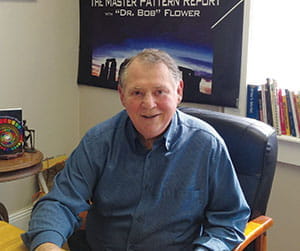Walden’s PhD in Management program helped one alumnus develop a new way of thinking about the world

Her husband had been killed, leaving her to raise two young children alone. She felt lost. Instead of sending her to a psychiatrist or a hypnotherapist, a friend sent her to Dr. Robert Flower ’94, a PhD in Applied Management and Decision Sciences (now PhD in Management) graduate.
Flower is a Mensa scholar known for founding The Gilchrist Institute for the Achievement Sciences—a sociopolitical and economic think tank—and for discovering Natural Thinking and Intelligence (NaTI). NaTI suggests that though we typically use linear thinking— following known cycles or step-by-step progressions—we’re better off thinking multidimensionally.
When the widow came to his office, Flower tried to help her think less about the material consequences of her husband’s death—missing his physical presence—and more about abstract concepts like finding love within herself.
“I worked with her for a month, but she wasn’t buying it,” he recalls.
But 6 months later, Flower was teaching a course at a local college and the woman was there. It turned out that she had warmed up to his methodology shortly after stopping her visits with Flower. “She said I helped her understand on a much deeper level what life was about as she tried to move on from her husband’s death,” he says.
Flower strongly believes he wouldn’t have been able to help her if he hadn’t completed his PhD. When he worked in real estate, he would satisfy his intellectual curiosity by researching ancient mysteries, reading sacred texts, and connecting them with principles of natural sciences and quantum physics. When he started connecting the dots, he felt his thinking process change.
“I began to understand a different order to things,” Flower says. “But I couldn’t quite relate it to everyday life.”
Walden connected those last dots. After learning general systems theory and writing his dissertation on nature as a systems model, Flower took abstract ideas like “a god force composed of living potential” and turned them into a coherent methodology. “I began to see the connection between my coursework and my research,” he says. “I discovered a structure, a science—the science of potential.”
Flower now works with a range of clients, including athletes; top executives from Macy’s, Progresso, IBM, and Chrysler; and notable figures like former hostage Terry A. Anderson, to help them change how they think.
“People achieve a lot more than they did when they were linear thinkers. NaTI brings clarity to issues in their lives and expands their understanding,” Flower says. “My knowledge from Walden helped me succeed, so now I can help others succeed.”



